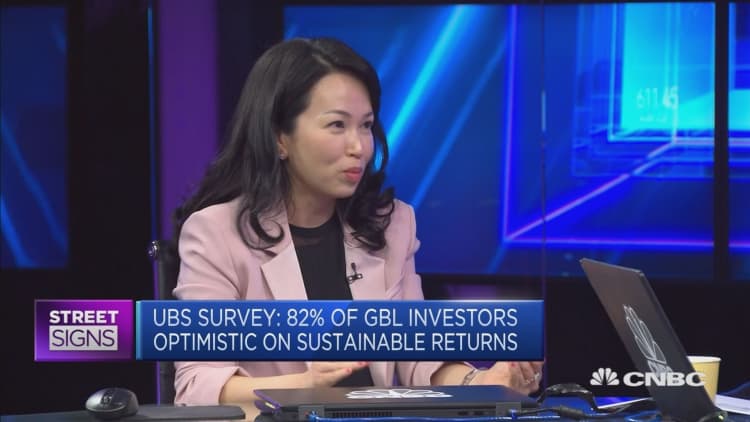When financial advisor Cathy Curtis takes on a new client, she gives them a questionnaire that asks, "Are you interested in impact or sustainable investing?"
Most people say yes to these investments, which involve putting money into companies that are keeping climate change and other concerns in mind, according to Curtis, founder and chief executive officer of Curtis Financial Planning in Oakland, California.
But then when the investing conversation goes further, there is often a caveat.
"Eighty percent of the time, the person will say, 'Yes, I'm interested as long as my return doesn't get affected by it,'" Curtis said. "There's this persistent myth that you can't get as good returns with investing for impact."
But there is little evidence to back those fears, according to the latest research from Morningstar.
In 2018, sustainable funds outperformed benchmarks, with 63 percent landing in the top half of their categories, the investment research company found. Just 37 percent finished in the bottom half of their respective categories for the year.
What's more, that strong performance holds if you look at sustainable funds' track records' over three and five years, though 2018 was a record year. That's in contrast to broader stock market returns, which in 2018 were the worst since 2008. Bond market returns were the lowest since 2013.
"There's really no evidence out there that this is an underperforming way to invest," said Jon Hale, head of sustainable investing research at Morningstar.

Measuring performance
Sustainable funds can be broken into many categories, according to Morningstar. They can range from funds that consider environmental, social and governance, or ESG, issues to those that are devoted entirely to those standards.
The category also includes impact funds that focus on societal or environmental impact areas, as well as those that do so exclusively on the green economy.
The ranks of sustainable funds have continued to grow. In 2018, the number of sustainable equity and bond funds climbed to 351 from 235 the previous year — a nearly 50 percent increase, according to Morningstar.
Those 351 funds, which come in both ETF and open-end varieties, managed a total of $161 billion as of the end of last year.
The perception that the funds may not perform as well dates to the 1980s and '90s, according to Hale, when socially responsible investments, or SRI, first came out.
Those early strategies required investors to exclude tobacco stocks, which were strong-performing holdings, particularly because of the dividends they paid.
The theory emerged then that if you were going to leave out those high-performing stocks, your portfolio would underperform, according to Hale.
"Empirically, there wasn't a whole lot of data to back that up," Hale said.
SRI funds figured out how to replace those tobacco holdings with other strong dividend-paying stocks. Today, portfolio construction abilities are even more sophisticated, making it even less of an issue, Hale said.
Watching costs
Yet another worry when it comes to sustainable investing is whether investors will pay more because of the costs associated with owning the funds.
About 30 percent of U.S. sustainable funds are passive strategies, such as index funds, according to Morningstar. The rest are active strategies, which generally tend to come with higher fees.
Still, investors should not pay more for these strategies than they would for regular investments, Hale said.

"They should not accept a premium for sustainable funds," Hale said. "There's no good reason for it."
That is because there are many low-cost sustainable fund options. There is one product, however, that sustainable funds generally cannot match: market-based index funds, which have fees as low as 5 basis points.
"You're not going to get that fee, but you're still going to be able to get into ESG passive portfolios for 15 or 20 basis points," Hale said. "Yes, it's way more than a market-based index fund.
"But in an absolute sense, it's low fees."
Proceeding with caution
Even as sustainable investing strategies grow, financial advisors say they are cautious about adding them to their clients' portfolios.
Curtis said she offers the strategy, but does not force it on her clients, who are predominantly women. If they feel strongly about impact investing, Curtis said she will create portfolios that are 100 percent invested with sustainable funds.
"Now there's enough funds where you can build a diversified portfolio," Curtis said. "There's funds represented in every asset class now. Three years ago, there wasn't."
More from Impact Investing:
How investors can save the planet and still make money
Self-driving cars could change commuting in retirement
How sustainable investing allows investing with conscience
But Eric Roberge, a financial planner and founder of Beyond Your Hammock, said 20 percent is the maximum allocation in these investments for his clients, who are in their 30s or 40s.
That's because there are still companies that tend to outperform that are not necessarily considered environmentally friendly, he said. Eliminating those companies could limit his clients' gains.
That could change as companies shift their strategies to become more environmentally friendly — and potentially reap stock rewards for doing so.
"At some point, the wave might shift," Roberge said. "But right now, we're not there yet. We're still very early on."
Still, Roberge said he is keeping an eye on innovation in sustainable funds. "Down the road, these types of investments are going to get better and better," he said.


